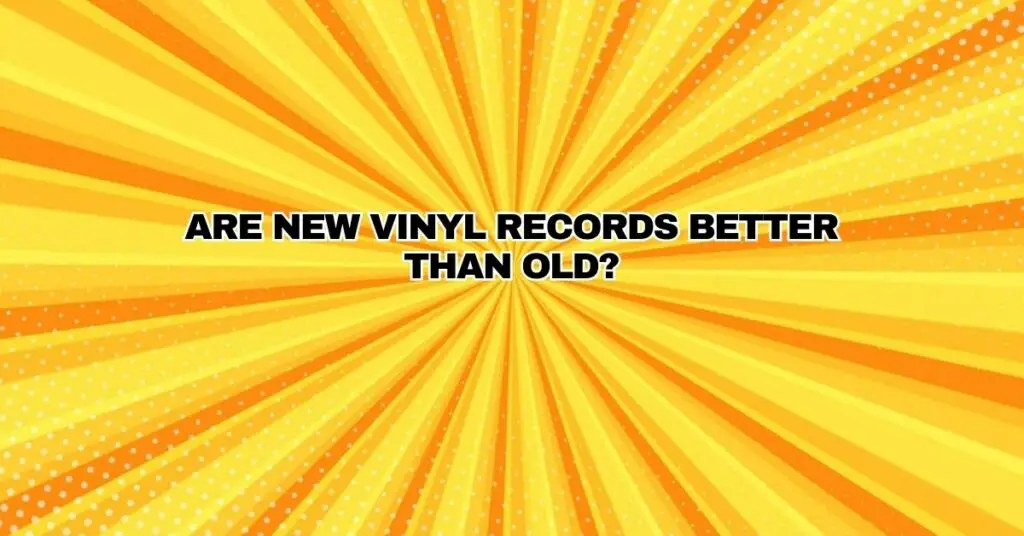The resurgence of vinyl records in recent years has sparked a spirited debate among music enthusiasts and collectors: Are new vinyl records better than old ones? Vinyl’s unique analog warmth and tactile charm make it an enduring format, cherished for its nostalgic appeal. In this article, we will explore the differences between old and new vinyl records, comparing aspects such as sound quality, collectibility, and overall value.
Sound Quality: Old vs. New
Sound quality is a paramount consideration when discussing the appeal of vinyl records. Here’s how old and new vinyl records stack up in this department:
Old Vinyl Records:
- Vintage Warmth: Many vinyl enthusiasts argue that older records, especially those from the heyday of vinyl in the 1960s and 1970s, offer a unique warmth and character. This vintage sound quality is often attributed to analog recording techniques, mastering processes, and the characteristics of vinyl as a medium.
- Limited Dynamic Range: Older records might have limitations in dynamic range, which can affect their ability to accurately reproduce audio. Some older records may have been overcompressed or mastered to accommodate the playback equipment of their time.
New Vinyl Records:
- Improved Quality Control: Advances in technology and quality control processes in the vinyl manufacturing industry have led to newer records being produced with fewer surface imperfections. This can result in less background noise and improved sound clarity.
- High-Quality Pressings: Audiophile-quality records and reissues are meticulously produced to offer pristine sound. They are often mastered from original analog tapes and pressed on high-quality vinyl.
It’s important to note that sound quality can be subjective, and what one person considers superior, another may not. Vintage records hold a special place in the hearts of many for their distinctive character, but new vinyl records have benefitted from modern production methods and can often rival their older counterparts in sound quality.
Collectibility: Old vs. New
Collectibility is another factor that distinguishes old and new vinyl records. Here’s a look at both sides:
Old Vinyl Records:
- Historical Significance: Vintage vinyl records are prized for their historical significance. They often capture pivotal moments in music history, featuring iconic artists and groundbreaking albums.
- Limited Pressings: Many older records had limited pressings, making them rare and highly sought after by collectors. First pressings, promotional copies, and special editions can command high prices.
New Vinyl Records:
- Modern Rarity: While new records may lack the historical significance of older ones, certain limited editions, colored vinyl, and unique pressings have made new records increasingly collectible. Collectors often seek out exclusive variants of contemporary releases.
- Reissues and Remasters: New vinyl records also offer the opportunity to collect reissues and remasters of classic albums. These releases often come with improved sound quality and additional content, making them appealing to collectors.
Value and Investment: Old vs. New
The value and investment potential of vinyl records are of interest to many collectors. Here’s how old and new records compare:
Old Vinyl Records:
- Potential Value Growth: Rare and highly sought-after vintage records, especially those in mint condition, can appreciate in value over time. First pressings and albums from influential artists tend to hold or increase in value.
- Historical Significance: Collectors are often willing to pay a premium for records with historical significance, making them attractive investments.
New Vinyl Records:
- Limited Editions: Certain limited-edition new releases can appreciate in value, particularly if they become sought-after collector’s items. However, the long-term investment potential of new records is less predictable than that of vintage records.
- Access to Music: New vinyl records offer the opportunity to access contemporary music on vinyl, which can be a valuable addition to a collection and appreciated for its cultural significance.
Conclusion
In the debate between old and new vinyl records, the answer isn’t black and white. The appeal of vinyl records transcends age, and both old and new records have their merits.
Old vinyl records are celebrated for their historical significance, warmth, and collectibility. They offer a nostalgic journey into the past, capturing the essence of music during specific eras. Vintage records, especially rare and iconic ones, can also be valuable investments.
New vinyl records, on the other hand, benefit from modern production methods, offering cleaner sound and fewer surface imperfections. Collectors can find value in limited editions and exclusive variants of contemporary releases. Moreover, new records provide access to the music of today, allowing listeners to build a collection that reflects their contemporary tastes.
Ultimately, the choice between old and new vinyl records depends on individual preferences and motivations. Whether you seek the timeless charm of vintage vinyl or the pristine sound of contemporary releases, the world of vinyl records continues to provide a rich and rewarding listening experience.


